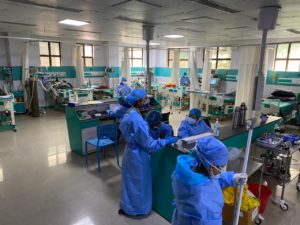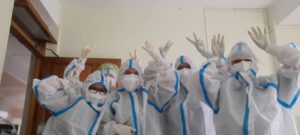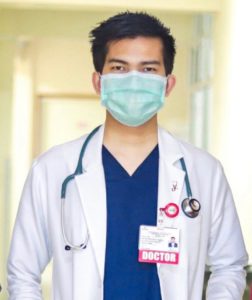Inside the Covid wards are stories of fortitude and resilience where the call for empathy rises from the depth of the hearts of healthcare workers bonding them in a rare show of solidarity while they fight a daily battle against an unseen virus.
As each health worker steps into a Covid ward there is trepidation. They know they are taking a risk to try and save another life. But that is a temporary dilemma. Duty and humanity take over when they see a suffering human. They quickly remember the oath they have taken and quickly don their PPEs and get into action.
Sunday Shillong spoke to a few healthcare workers to understand the range of emotions they experience during these trying times.
Fighting Together
What keeps the doctors going is a shared responsibility to serve suffering humanity. At the end of every day, they compare notes and share their daily experiences. Some have a hard day; others a day of learning even from patients.
Director NEIGRIHMS, Dr P Bhattacharyya, says: “I have excellent colleagues who inspire and give me confidence. Alone, it would have been very stressful to face the day.”
There is a sense of pride among the junior doctors, in particular, when they find solutions to problems and their intervention works. With Covid every day brings a new set of challenges.
Dr Macmillan Surong of Civil Hospital says, “Every day I pray for strength, wisdom and protection of my team and for healing for all patients.”
Doctors rightly sing praises for their teams and a team means nurses, ward boys/girls who are physically present with patients and attend to their needs. Every act of courage, however small has a chain reaction. One good action inspires another. The team of doctors and nurses know how important it is to keep the morale up at these times and that’s what they try to do.
Keeping vigilance over patients for long hours is very stressful, confides Dr Debomallya Bhuyan, who is in charge of the Covid-19 ward at Nazareth Hospital. “I have immense responsibility towards my team. Realising the value of life and family has brought us closer and we support each other,” he adds.
Quite a few doctors from different hospitals in the city have contracted the virus. Dr R.S. Thangkhiew of Supercare Hospital said they had to be kept in isolation wards. “When there is the slightest risk of overexposure, they get tested. In fact, the spirit of sacrifice and service among junior doctors is impressive. They tackle everything so they are the ones who get exposed,” Dr Thangkhiew said.
Dr Kyntiewlang Sanmiet, Nodal Officer for Covid-19 at Bethany Hospital is all praises for the administration, stating, “When times are tough, we pull together, roll up our sleeves and press on. Even in times of uncertainty, we have each other.”
“New Normal”

Wearing a PPE kit in the summer heat, carrying a sanitiser at all times and wearing a mask is the norm now. From being drenched in sweat and fogging of glasses to balancing life between hospital and home and avoiding travel – the healthcare staff have been through it all.
And then there’s Dr L. Kahit of Civil Hospital who says, the new normal is not new anymore. Her take is, “The virus has been here for over a year now. It’s time we learnt to accept this and adapt accordingly.”
Her colleague, Dr P. Pakma, said, “In 2020 we were stigmatised because of our work in the Covid-19 unit. People tried to avoid us but we have overcome that dark phase and have learnt to live with the virus.
The declaration of the global pandemic last year had struck terror induced by the fear of the unknown. Doctors were not sure what was happening around them but the healthcare workers were better prepared in 2021. They are careful not to let their guards down, be it in the Covid ICU or at home.
They are constantly updated with new information even as they continue to observe the virus’s behaviour. Thanks to the training sessions that are held from time to time the healthcare staff adapt to changing scenarios as the virus continues to mutate.
All health workers agree that this is an unprecedented situation. Dr Sanmiet says, “Never in a million years did I ever think I’d be part of the healthcare workforce during a pandemic.”
Coping with Reality

Day in and day out, the frontline warriors in hospitals deal with both death and recovery.
Dr Bhattacharyya recalls the case of an 87-year-old patient. He wanted to live and showed signs of recovery after a long time. He could not believe that he had come out of his ailment That gave the doctors hope. He says that is the most crucial period for a patient.
Recovery is a double-edged sword, a dicey period because the situation can worsen. Dr Kahit says how cases of recoveries feel like a blessing and give her a sense of deep satisfaction.
It gets difficult to handle family members when they lose a loved one. Dr Bhuyan says, “People are emotional. They take time to accept negative news.” Under such circumstances, the healthcare staff avoid statements such as “I can understand how you feel”. While they empathise, they cannot allow themselves to be overcome by sorrow, as that can prevent them from getting back to the battle zone.
Doctors and the nurses get attached to the patients, more so, when they stay in the ward for a long time. The intensity of the deaths has affected many of them and affected their mental health. Hence hospitals have counsellors to help health workers overcome depression and post-traumatic stress disorders.
Every health worker has their own coping mechanism. Dr Thangkhiew says, “I play with my dogs when I am home. Animals are such wonderful companions.”
Dr Surong has two kids. He spends time with them and often watches cartoons with them. Dr Sanmiet and Dr Pakma busy themselves with reading, listening to music and checking in regularly with family and friends via social media and face-time.
Family is a source of great strength and Dr Arnab Roy recognises that. However, he misses the long drives because the second wave demands his attention. He wants the pandemic to end soon. His daughter was born last November and is just six months old and he finds serenity just by looking at her innocent face.
For Dr Bhuyan music is the balm that helps him relax after a hectic day.
Balancing the Professional and Personal
Dr Thangkhiew takes pride in the “amazing” nursing staff. “They work up 12 hour shifts without a break and don’t take off-days even after working for a whole week at a stretch. They virtually live on the campus,” Dr Thangkhiew recounts.
Dr Kahit echoes Thangkhiew’s sentiments. “Our nursing staff are integral to our team. They are sincere and courageous. You cannot believe the sacrifices they have made,” she says.
Women healthcare staff have risen to the occasion despite their hectic schedules. From balancing work and childcare to being frontline workers, they are resilient in more ways than one.
Doctors feel privileged to work with the nursing staff and Covid patients who have recovered say they owe their lives to their nursing attendants. “They take care of patients with such love and constantly provide information to patient’s attendants, knowing well that there are risks.
Many of them have little children but continue working despite the risks involved. Some nurses work seven days a week in the Covid ICU and are isolated in the nurses’ hostel for another week. Celebrating their spirit of sacrifice, Dr Bhattacharyya says, “Bravery is to move forward with the fear. They know they walk into a war zone daily.”
Post-Covid World
Recent cases of violence against healthcare professionals; doctors in particular, have exposed the faultlines in our system and the need for a law to protect them. Doctors have unanimously condemned these acts as being inhuman and a sad reflection of how thankless we are as a society.
Dr Bhuyan rues the fact that after all they do and the sacrifices they make, doctors are beaten up for not being able to save a life. “These incidents have disheartened the medical fraternity across the country. However, despite the pressures and challenges, we will continue to serve society to the best of our ability,” he adds.
Cases of online abuse have also surfaced – doctors of Ganesh Das Hospital had to endure it.
“We have been trained to be strong, calm and compassionate but people forget we are humans too and suffer from the same emotions that afflict all humans,” Dr Surong says.
Doctors are unanimous that the pandemic is there for the long haul and their task will continue to be challenging. But they also feel blessed to serve and to enjoy whatever family time they can afford to.
Dr Roy says, “A tiny virus has disrupted lives everywhere. Even developed countries have suffered. Now is the time to reshape our values. Nature works in mysterious ways and we will continue to be hit by viruses till we educate ourselves.”
Message for the people
The frontline warriors have this to say: “Take necessary precautions if you want the lockdown to be lifted. Maintain physical distance. We cannot blame the government or the virus if we do not maintain strict Covid protocols and get vaccinated to develop immunity.”



